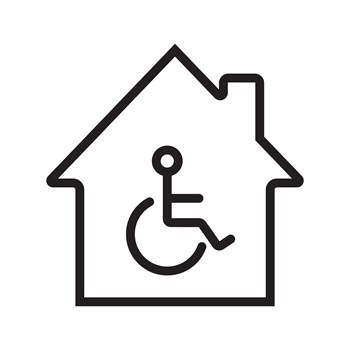
Q. When my husband and I bought our townhouse-style condominium years ago, it seemed pretty accessible, even as we aged. Recently, however, my husband developed a medical problem that requires him to use a wheelchair, and it will be a long-term situation. We can deal with the condo’s interior, as there are enough rooms on the first floor to accommodate our needs. But the single step from the sidewalk to the front door is now an obstacle, and there also is no nearby curb ramp to get from the parking lot to the sidewalk in front of the building.
What options do we legally have in terms of installing a low ramp at the front door? Can the association prevent us from doing this? And can we ask for (or require) a handicap access curb ramp to enable us to easily get from our car to the building?
—Seeking Solutions
A. “This question presents a common situation involving what appears to be a request for a ‘reasonable modification,’” says Scott Eriksen, partner in Perkins & Anctil, PC in Westford, Massachusetts. “Both federal and Massachusetts law, the Fair Housing Act (FHA), and M.G.L. c. 151B prohibit discrimination in housing based on handicap, and the term ‘handicap’ is similarly defined under both laws as ‘(1) a physical or mental impairment which substantially limits one or more of [a] person’s major life activities, (2) a record of having such an impairment, or (3) being regarded as having such an impairment.’
“The FHA makes it unlawful for any person to refuse ‘to permit, at the expense of the [disabled] person, reasonable modifications of existing premises … if such modifications may be necessary to afford such person full enjoyment of the premises…’ 42 U.S.C. § 3604(f)(3)(A) [Emphasis added]. A ‘reasonable modification’ is a structural change made in order to afford a handicapped person full enjoyment of their home, like a ramp, a railing, or other similar installations. ‘Reasonable modifications’ can include alterations to interiors and exteriors of dwellings and also to common areas. The FHA generally makes it unlawful for an association to refuse to allow a ‘reasonable modification’ to the premises when necessary to afford an individual full enjoyment of his dwelling; however, the individual requesting the modification is responsible for paying the costs of the modification. The individual must have the association’s approval before making any modifications but if the individual meets the requirements under the FHA and provides the requisite documents and assurances, the association will generally not be able to legally deny the request.
“In many respects, applicable Massachusetts law mirrors the FHA. However, it is not always as clear under the Commonwealth statute which party is responsible for paying the costs of making a ‘reasonable modification.’ Massachusetts General Laws c. 151B, §4(7A) provides that ‘discrimination on the basis of handicap shall include but not be limited to … a refusal to permit or to make, at the expense of the handicapped person, reasonable modification of existing premises … if such modification is necessary to afford such person full enjoyment of such premises; provided, however, that, in the case of … multiple dwelling housing consisting of ten or more units, or contiguously located housing consisting of ten or more units, reasonable modification shall be at the expense of the owner or other person having the right of ownership…’
c. 151B, §4(7A) [Emphasis added]. Many condominiums fall under the category of ‘multiple dwelling/contiguously located housing consisting of ten or more units,’ and since the condominium organization is the ‘owner or other person having the right of ownership’ over the common areas of the condominium, an organization may be held responsible for paying the costs of ‘reasonable modifications’ to such areas. This analysis will usually hinge on the particular circumstances of the request and the association’s resources.
“The resident here would do well to communicate directly with the board of the organization to discuss a reasonable modification and see if the parties can agree upon how to implement an appropriate solution for all.”






Leave a Comment